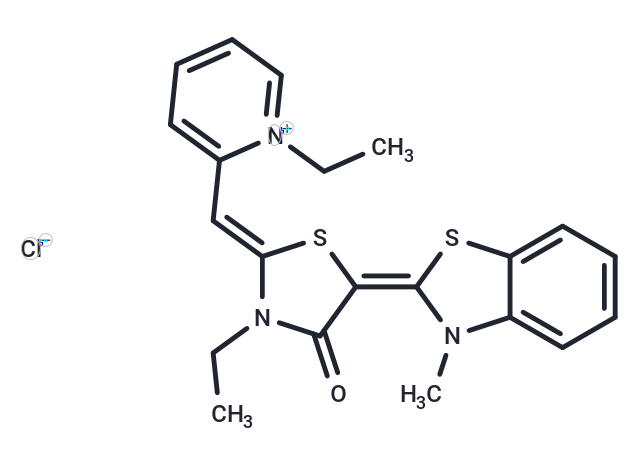Shopping Cart
- Remove All
 Your shopping cart is currently empty
Your shopping cart is currently empty

MKT-077 (FJ-776) is a cationic rhodacyanine dye that demonstrates antiproliferative activity against cancer cell lines (EC50s: 1.4-2.2 μM in vitro) through its ability to inhibit members of the Hsp70 family of molecular chaperones.

| Pack Size | Price | Availability | Quantity |
|---|---|---|---|
| 1 mg | $31 | In Stock | |
| 5 mg | $85 | In Stock | |
| 10 mg | $150 | In Stock | |
| 25 mg | $255 | In Stock | |
| 50 mg | $409 | In Stock | |
| 100 mg | $531 | In Stock | |
| 1 mL x 10 mM (in DMSO) | $98 | In Stock |
| Description | MKT-077 (FJ-776) is a cationic rhodacyanine dye that demonstrates antiproliferative activity against cancer cell lines (EC50s: 1.4-2.2 μM in vitro) through its ability to inhibit members of the Hsp70 family of molecular chaperones. |
| In vitro | MKT-077 treatment (0.1-10 μM) for 48 hours can effectively decrease TT cell viability. MKT-077 treatment results in the accumulation of cells in the G0/G1 phase in a dose-dependent manner, and also increases the sub-G0/G1 phase population in TT cell culture in a dose-dependent manner. MKT-077 also downregulates cellular levels of the proliferation marker, Ki67, and the S-phase transcription factor, E2F-1, in TT and MZ-CRC-1 cells. Moreover, TT cells can uptake and retain MKT-077 at significantly higher levels than MZ-CRC-1 cells [1]. MKT-077 has EC50 values of 1.4±0.2 and 2.2±0.2 μM against MCF7 and MDA-MB-231 breast cancer cells, respectively [2]. |
| In vivo | Systemic administration of MKT-077 significantly delayed the growth of TT xenografts in mice throughout the treatment. At the end of the drug treatment, we found that tumor weights were about two-timed less in MKT-077-treated group than in the control group. These data are consistent with the growth inhibitory effects of MKT-077 observed in the in vitro setting above [1]. The succinate-induced, ADP-stimulated respiratory rate in mitochondria isolated from the liver of rats treated with a bolus i.v. injection of 15 mg MKT-077 1kg body weight each day for 5 days is significantly lower than that of untreated controls [3]. |
| Cell Research | MTT assay was performed as previously described. Briefly, cells were seeded in 24 well plates and allowed to attach for 48 hours. After drug treatment, cells were incubated with 400 μL of MTT (0.5 mg/mL) in complete medium for 2 hours at 37℃, switched into 200 μL DMSO, and shaken for 5 minutes at room temperature before measuring absorbance at 540 nm [1]. |
| Animal Research | The 1×10^7 TT cells in 200 μL Hank's balanced salt solution were inoculated subcutaneously into the rear flanks of 6-week-old female athymic nude (nu/nu) mice. Once palpable, tumors were measured using Vernier calipers at intervals indicated in the text. Tumor volumes (TVs) were calculated using the formula: TV=L×W^2×0.5 (L, length; W, width). When TV reached 100 mm^3, mice were sorted into groups of 8 to achieve equal distribution of tumor size in all treatment groups. Group 1 received only the vehicle (1:9 mixture of DMSO/saline) and group 2 received MKT-077 (10 mg/kg body weight/dose). A 200 μL of ether solution was administered by intraperitoneal injection every 2 days (total 10 doses). At the end of the experiments, animals were euthanized by CO2 asphyxiation [1]. |
| Alias | MKT077, MKT 077, FJ-776 |
| Molecular Weight | 432 |
| Formula | C21H22ClN3OS2 |
| Cas No. | 147366-41-4 |
| Smiles | [Cl-].CCn1\c(=C\c2cccc[n+]2CC)s\c(=C2/Sc3ccccc3N2C)c1=O |
| Relative Density. | no data available |
| Storage | keep away from direct sunlight | Powder: -20°C for 3 years | In solvent: -80°C for 1 year | Shipping with blue ice. | ||||||||||||||||||||||||||||||||||||||||
| Solubility Information | H2O: 20 mg/mL (46.3 mM), Sonication is recommended. DMSO: 55 mg/mL (127.31 mM), Sonication is recommended. | ||||||||||||||||||||||||||||||||||||||||
Solution Preparation Table | |||||||||||||||||||||||||||||||||||||||||
H2O/DMSO
DMSO
| |||||||||||||||||||||||||||||||||||||||||

Copyright © 2015-2025 TargetMol Chemicals Inc. All Rights Reserved.